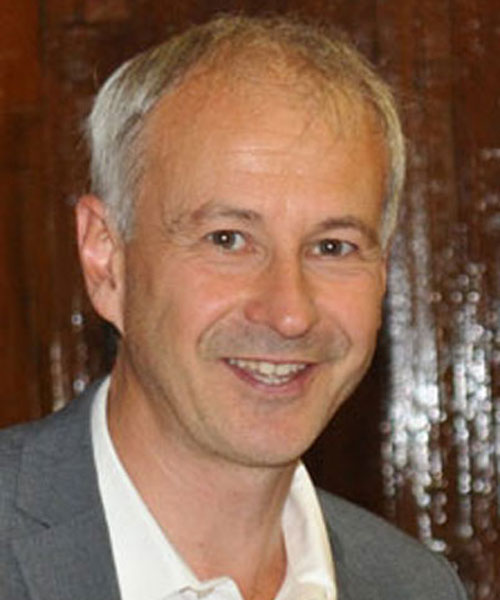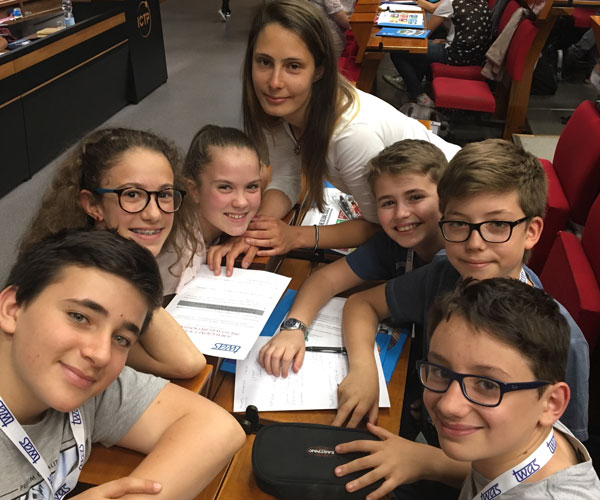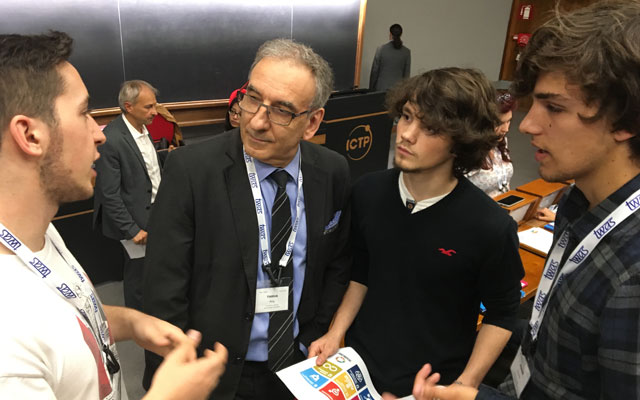
Each time we machine-wash that sweater we love so much we involuntary release in the environment plastic microchips that enter the food chain, damage fish and, ultimately, fill our meals with undesired noxious substances. Knowing this, we know more about how to live sustainably.
TWAS's programme officer Max Paoli used this observation to welcome 120 students of middle and high schools, who came to The World Academy of Sciences (TWAS) from Trieste, Friuli Venezia Giulia and Slovenia to attend the workshop "Training and science for sustainable development" on 23 May.
"You are tomorrow's generations, and it's up to you help developing sustainable solutions, knowing that we already have some options to solve our problems," Paoli said. "One day, some of you could be policymakers and opinion leaders, maybe inspired by the work we are going to do today."
The workshop was organized by TWAS within the national Italian Festival for Sustainable Development, promoted by the Italian Alliance for Sustainable Development - ASVIS. The workshop was hosted by the International Centre for Theoretical Physics (ICTP) in Trieste, in the Paolo Budinich hall, and sponsored by TWAS.
It aimed at exposing school students to the principles underlying the 17 UN Sustainable Development Goals (SDGs) and their 169 associated targets, and at inspiring potential actions that nations – but also individuals – should take to achieve them by 2030.
"This workshop, in a qualified place like TWAS, offers a very important chance for active citizenship," noted Philip Tarsia, a professor of English at Liceo Galileo Galilei in Trieste. "I see how my students are working and using their critical thinking to become more and more independent. I'm proud of them: this experience makes them grow."
The institutes were: scientific high schools Galileo Galilei and Guglielmo Oberdan; institutes Deledda-Fabiani, Carli-Da Vinci de Sandrinelli, Jožef Stefan, Istituto Tecnico Statale Žiga Zois and Scuola Secondaria di Primo Grado Statale Lionello Stock, all from Trieste; Scuola Media Igo Gruden from Aurisina; Scuola Secondaria di Primo Grado "Nazario Sauro" from S. Giorgio di Nogaro; and Ginnasio Antonio Sema from Piran, Slovenia.
"Part of our future could be already compromised by the way we misuse Earth's resources. But if we want to contain damages and grant sustainable living conditions to tomorrow's generations, we need to act on various fronts," Paoli said.
An important step, he explained, would be assessing the ecological footprint of humans on Earth, according to UNESCOs' indications. We all consume goods and what Nature offers, hence we all have an impact on our plane t. We all leave a footprint – and this footprint can be calculated and expressed by a number, reflecting the resources a nation consumes and the waste it emits.
t. We all leave a footprint – and this footprint can be calculated and expressed by a number, reflecting the resources a nation consumes and the waste it emits.
Not all nations are active on this front. However, some examples such as Chile, where UNESCO has helped to implement school programmes adding the "ecological footprint" concept, do exist. There, school students learn how to calculate their own ecological footprint and are aware of its impact.
Through a number of well-focused examples regarding three Sustainable Development Goals – affordable and clean energy (goal n.7), responsible consumption (n.12) and climate action (n.13) – Paoli took the students to understand the importance that small steps can have to achieve bigger objectives.
With the help of inspiring videos on the effects of plastic pollution, the role of methane gas with respect to carbon dioxide in triggering the greenhouse effect and the pervasive culture of waste, he urged the students to believe that part of the future is already in their hands.
Cattle and other livestock cause more damage to the environment than CO2 emissions from urban places because they produce a lot of methane, a devastating greenhouse gas that, for the way it absorbs heat, warms the planet 86 times as much as CO2.
Plastic-related damage to sea life was expressed in a troubling image: a turtle whose shell had been trapped at a young age in a plastic ribbon, forcing the reptile's shell to grow deformed, and most likely causing a lot of pain to the animal. Actions are possible if we think that even Kenya has issued one of the world’s toughest ban on plastic bags, Paoli commented.
The workshop's proactive atmosphere peaked further when the students grouped up to work together on the three chosen SDG objectives. Their task was to come up with recommendations regarding small actions that they could take even at their school communities or at home.
Students from Piran suggested growing modified bacteria able to degrade plastic debris, while students from Jozef Stefan in Trieste proposed mobile phone covers equipped with tiny solar panels to provide free energy to the devices. Other good practices included early education on what waste is and how to recycle goods turning them into zero-cost school supplies (Institute Deledda-Fabiani, 1st winner).
 Based on creativeness, feasibility and personal engagement in the formulation of the recommendations, three top schools won honours for their recommendations.
Based on creativeness, feasibility and personal engagement in the formulation of the recommendations, three top schools won honours for their recommendations.
In addition to top winner Institute Deledda-Fabiani, they were: Scuola Secondaria Statale Lionello Stock, second prize for their suggestion to buy food from local producers instead of relying on massive import systems; and Scuola "Nazario Sauro" from S. Giorgio di Nogaro for their suggestion of multiple recycling of waste, to maximize the use of apparently useless items.
"We need to change the way we use Earth's resources also through science and education," Paoli concluded. "And you could be really tomorrow's leading actors."
Cristina Serra

